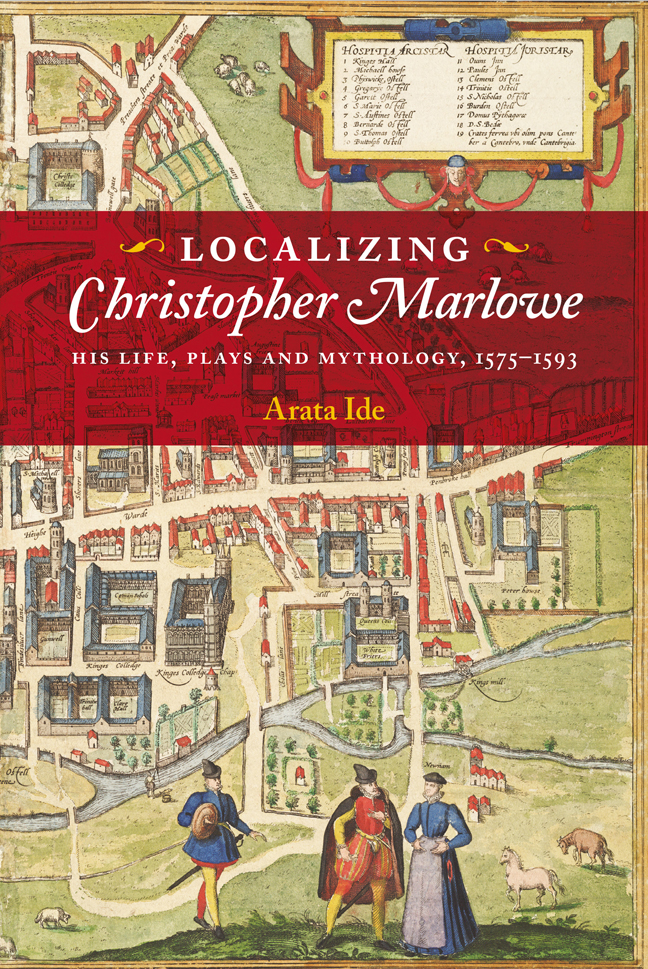Book contents
- Frontmatter
- Dedication
- Contents
- List of Illustrations
- Acknowledgements
- List of Abbreviations
- Timeline
- Note for the Reader
- Introduction
- Part I Life
- Part II Plays
- Part III Myths
- Conclusion
- Appendix 1 Transcript of the plan in Norfolk Record Office, NRS 23372, Z99
- Appendix 2 Transcript of the plan in Corpus Christi College Archives, CCCC08/28
- Appendix 3 Transcript and translation of the John Marley vs Nevell Hayes case
- Appendix 4 List of Foundation Scholars of Corpus Christi College, 1573–87
- Bibliography
- Index
- Miscellaneous Endmatter
2 - Marlowe in the Community of Canterbury Scholars
Published online by Cambridge University Press: 22 February 2024
- Frontmatter
- Dedication
- Contents
- List of Illustrations
- Acknowledgements
- List of Abbreviations
- Timeline
- Note for the Reader
- Introduction
- Part I Life
- Part II Plays
- Part III Myths
- Conclusion
- Appendix 1 Transcript of the plan in Norfolk Record Office, NRS 23372, Z99
- Appendix 2 Transcript of the plan in Corpus Christi College Archives, CCCC08/28
- Appendix 3 Transcript and translation of the John Marley vs Nevell Hayes case
- Appendix 4 List of Foundation Scholars of Corpus Christi College, 1573–87
- Bibliography
- Index
- Miscellaneous Endmatter
Summary
‘THE STUDENTS SHALL BE BRAVELY CLAD’
And now suppose, sweet lady, you see me set forth like a poor scholar to the university, not on horseback but in Hobson's waggon, and all my pack contained in less than a little hood-box; my books not above four in number, and those four were very needful ones too.
To a poor newcomer, collegiate life would not necessarily have seemed to be filled with the bliss of adolescence. At college, a little commonwealth in itself, he had to face the harshness of a real world in which social divisions among the student body reflected those of a strongly class-conscious society at large. In the Elizabethan period, sons of the propertied class went up to Oxford and Cambridge in large numbers in search of social advancement. Certainly, as pointed out by Lawrence Stone, the influx of so many wealthy students opened the door for education to the poor more than ever before, because ‘the presence of these wealthy Fellow-Commoners meant that a certain amount of personal charity was distributed among the poor students in the Colleges’. Even so, this trickle-down effect must have been very difficult for a poor student to experience on a daily basis and he would consequently have been forced to suppress his mixed feelings of envy and contempt towards wealthier students. He may have salvaged his pride by devoting himself to his classical studies, as can be observed in Thomas Middleton's ‘The Ant's Tale’, in which the narrator recollects his collegiate days as a ‘servitor to some Londoner's son’: ‘Now as for study and books, I had the use of my young master’s, for he was all day a courtier in the tennis-court tossing of balls instead of books, and only holding disputation with the court-keeper how many dozen he was in.’
Salvaged pride could more or less relieve a poor student of the psychological burden of his social inferiority, but not the financial one. Masters and fellows were often lenient with young men in affluent circumstances; in contrast, a poor student was in the disadvantageous position of being economically weak, mercilessly pursued for payment, and, in some cases, even exploited by fellows and creditors.
- Type
- Chapter
- Information
- Localizing Christopher MarloweHis Life, Plays and Mythology, 1575-1593, pp. 64 - 88Publisher: Boydell & BrewerPrint publication year: 2023



